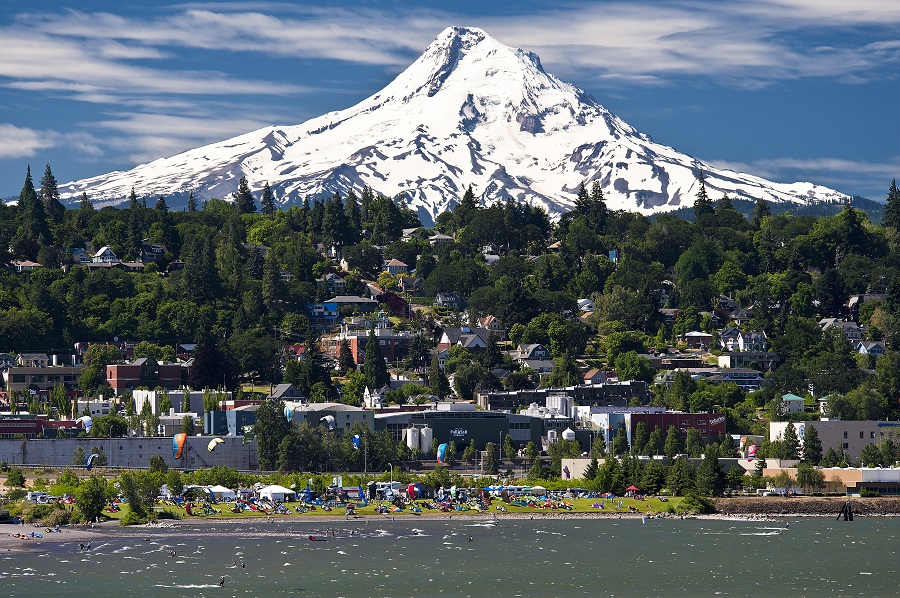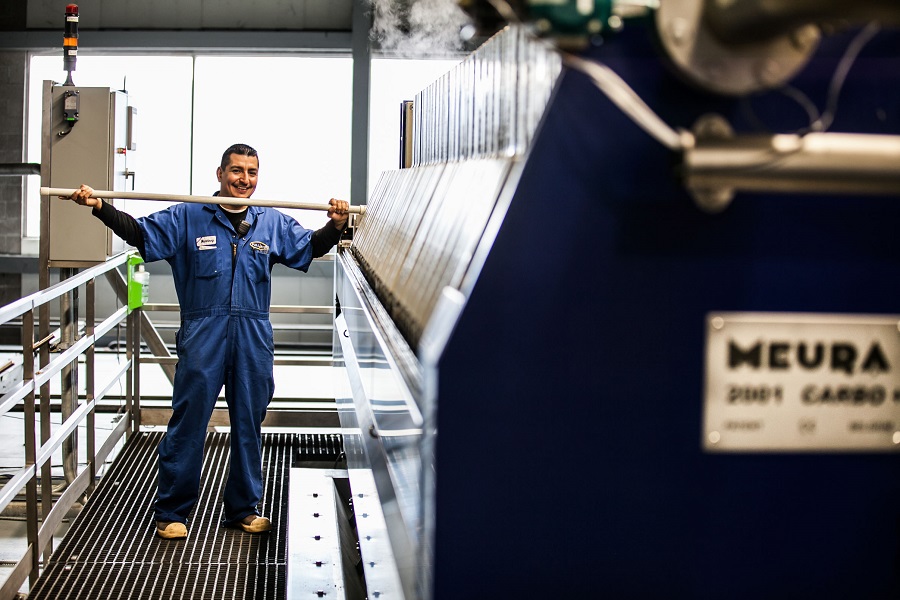Brewed the Sustainable Way: That's Full Sail's DNA
Apr. 24, 2015

You’ll hear it time and time again at Full Sail Brewing Co: “Sustainability is in our DNA.” From VPs and sales personnel to brewers and bottlers, it is a phrase that is repeated on loop, as if it was an echo bouncing off of the walls of the nearby Columbia River Gorge. Sustainability might appear as just another greenwashing phrase that gets thrown around during tours, meetings and events, but at Full Sail this couldn’t be further from the truth. Like the pristine Columbia River that flows by just outside the brewery, sustainability has shaped Full Sail during its 28 years in business, and in that time sustainability has become more than just a word, it is a way of living.
The Headwaters: It All Starts at the Top
From its very inception, Full Sail has always operated with its environmental impact on top-of-mind. Founder and CEO Irene Firmat chose the brewery’s Hood River location, not just because of the area’s natural beauty, but because of its proximity to the local farms which would be supplying ingredients.
“99% of the ingredients that go into our beer come from local sources,” said Sandra Evans, marketing manager at Full Sail. “All of our clean, fresh water also comes straight from Mount Hood.”
Instead of building a new brewery from the ground-up in Hood River, Full Sail set-out on a path to renovate the old Diamond Fruit cannery and turn the abandoned building into its shiny new brewery of the future.
“We were just a small start-up brewery looking to stay in business,” said Sandra. “Back then, sustainability meant being frugal. How can we save electricity on the boiler? How can we use less water? Less heat? For us it was about going after the low-hanging fruit. These factors made good business sense and had a positive impact on the environment which we found to be a great place to start.”
The Tributary: Employee Driven Decisions
Sustainability isn’t a corporate mandated decision at Full Sail, it is an employee driven one.
“It all starts at a personal level,” said Evans. “A lot of the sustainable efforts we do come from the people that work here, hands-on, every day.”
One of the best examples of this is the brewery’s decision to invest in a plastic baler.
“Years ago one of our workers noticed that we have a lot of wasteful shrink wrap around and suggested we get a baler to cut down on the waste,” said Evans. “So we said, ‘OK, let’s look into the baler.’ So we looked into it and learned that we could bail our shrink wrap and then resell it for use in trex decking. So instead of throwing it in the trash we ended up recycling it into decking. We then built our deck and patio out of that recycled material.”

Full Sail’s employees were also at the helm of the brewery’s decision to operate under a 4/10 workweek. By firing up the boilers and brewing from start-to-finish in four, 10-hour days, the brewery becomes more efficient, limiting the amount of energy wasted on utilities. It also gives the employees a three day weekend, providing a grounded balance that is very important to Full Sail.
“It is pretty amazing that once you start engaging your people who work in the brew house, you realize that a lot of these values are shared among everyone and it just naturally takes off from there,” added Evans.
The Channel: Shaping the Industry by Leading It
From going after low-hanging fruit to engaging employees in the decision making process, Full Sail has continued to lead the industry in sustainable brewing practices. For starters, the brewery owns and operates its own waste water treatment plant on site. The biosolids from the treatment plant are captured and recycled by giving them to local farmers and orchardist who use them for soil amendment and fertilizer instead of consuming landfill capacity.
Full Sail is also only one of two breweries that owns and operates a Meura mash filter, which takes the water usage of the brew house from 6-6.5 gallons of water to produce one gallon of beer, to 2.5 gallons of water for every one gallon of beer produced. Oregon farmers and dairy cows are also beneficiaries of the Meura filter, as Full Sail recycles its spent grain and yeast solids annually to local dairy farmers for feed. The mash filter produces drier more viable spent grain that makes for better cow feed and reduces the number of spent grain truck runs to the pastures by over 70 per year. Those cows then produce the milk for the cheese and ice cream that are served in Full Sail’s attached pub.
The brewery also operates a hot water recovery system that recaptures hot water for reuse in the brew house and reduces water consumption by approximately 3.1 million gallons per year. Even small things like reducing the spray nozzle apertures on bottle and keg washers and adding a glycol chiller in tandem with our heat exchanger helps to reduce the Full Sail’s water use to an industry-leading low.
Aside from creating a perfect storm for exceptional craft beers, these measure also have an added benefit: Increased sales with the quintessentially eco-friendly neighbors of Portland and nationwide.
“People are unbelievable environmentally conscience. For us it is an advantage,” said Andy Krakauer, Full Sail’s VP of Sales. “People are now making their buying choices based on a company that they can align their values with. I make sure that I remind our guys all the time to talk about it. Sustainability really is in every body’s DNA here.”
.jpg?la=en&hash=E79A057EB76C3E99163AA544EEDBF5F408EBDDAC)
The River Bank: Better Beer for a Better Community
As Full Sail has grown and prospered in region, so has Hood River. The two have a symbiotic relationship, both deeply vested in the success and well-being of the other one. Full Sail is dependent on the clean water, locally grown ingredients and awe-inspiring beauty the region provides. Likewise, Hood River is dependent upon Full Sail as a beacon for the community and the region’s shining jewel for tourists and local craft beer lovers alike.
To ensure that both continue to thrive, Full Sail was a founding member of the Hood River Chamber of Commerce’s Green Smart program. The goal of Green Smart is to help businesses and organizations within the Hood River watershed increase their productivity and profitability by improving resource efficiency and by reducing waste and pollution.
The Mouth: It’s All About the Beer
“Along with all of the sustainability and environmentally conscience practices, what sometimes gets lost is that the beer is un-freaking believable,” said Krakauer.
The judges seem to agree. To date, Full Sail has earned over 150 gold and silver medals, many from the prestigious World Beer Championship and Great American Beer Festival. The brewery was also named Beverage World Magazine’s Craft Brewery of the Year in 2014.
Even as industry vets, these awards and accolades don’t come easy. The beer industry is growing at breakneck speed with new breweries their beers appearing on shelves and on draft every day. In addition to sustainability being ingrained in Full Sail’s DNA, so is the passion for producing consistently wonderful beer. Whether it is their Amber, IPA, Bock or classic Session, every ale and lager that comes out of the brew house must meet long-time brewmaster Jamie Emmerson’s high standard of quality.
“Good beer doesn’t happen by accident,” said Krakauer “We pour our hearts and souls into every batch we brew and we love to see people taste that passion when they open one of our bottles of beer. We strive for that same incredible quality every single time."